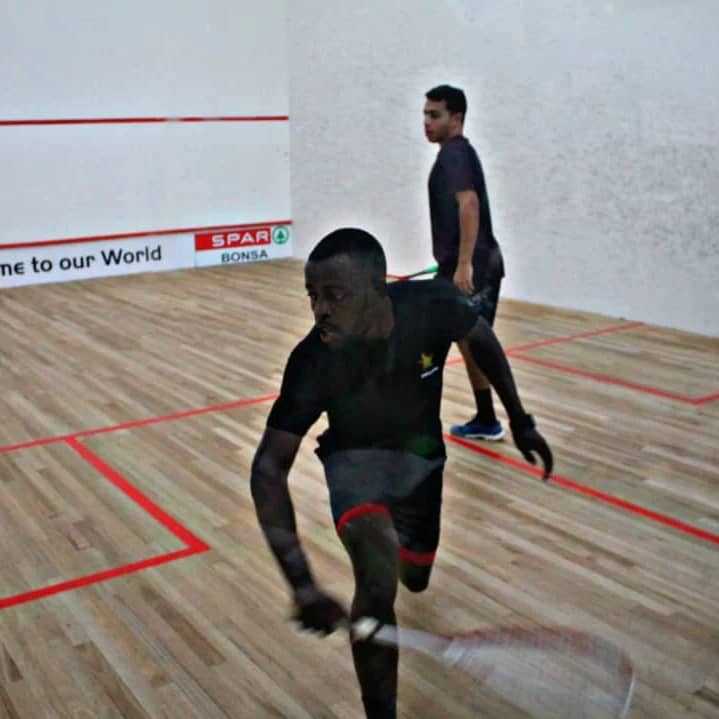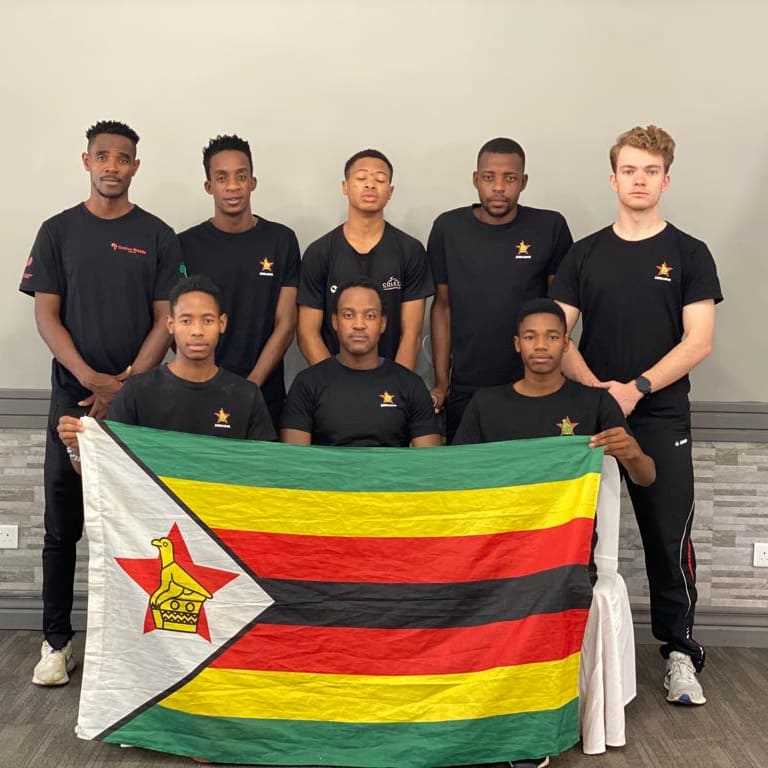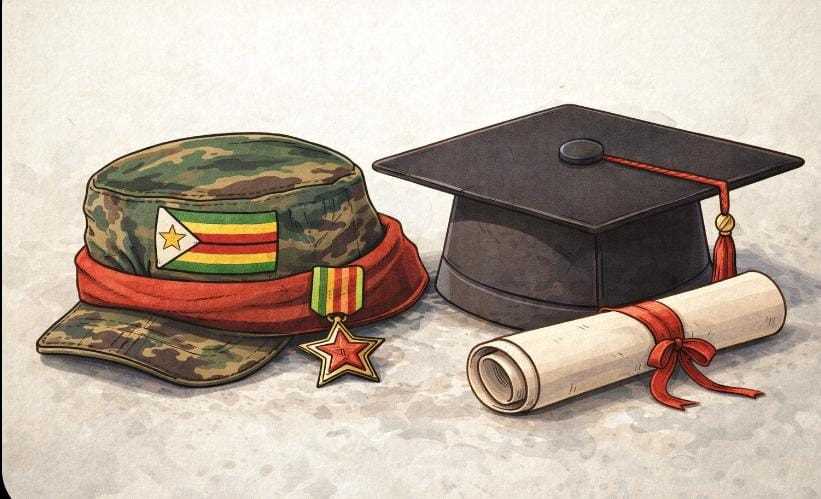
Patience Muchemwa
Growing up in abject poverty, squash guru, Nishyto Munyoro worked hard to make it in life and staying on course through squash. He worked hard and made it to the national team and collected several trophies.
Now, he is fulfilling his dreams as a squash coach at St George’s College, who are the defending champions in the country.
Munyoro started playing squash in 2011 when he was only twelve years old and is a holder of level 2 world squash certificate.
The 24-year-old Munyoro was born on December 25, 1999 at Epworth Poly Clinic.
Munyoro is the last born in a family of four, three boys and one girl. His mother looked after them after she had separated with his father.
“My parents separated soon after giving birth to me. We grew up in Eastview, it was called kwaBhobho then) where we started living there in 2000 after my mom couldn’t afford to pay rent in Mabvuku-Tafara suburbs.
“We stayed in an open space, no roofs for five months while she was looking for ways to build a house. My family isn’t well educated, l went to six primary schools because my mom couldn't afford fees so she used to move me from one school to another.
“All surrounding schools ended up not accepting me because I could not afford to pay fees. I can't even remember my primary friends,” he says.
Munyoro got married at an early age and had two kids, his first born is a girl aged six and a boy aged four. He got separated with his wife and shared the kids and he is living with the boy.

“So, my sister lived in a police camp and there was a squash club opposite the camp. One day, l asked the guy who looked after the place if it was a shooting club which l was hoping it was because l love guns. He said it was a squash club, inviting me to come in and see. As l entered, l started laughing looking at people chasing after a very small rubber ball, they asked me to come and try it. l went in barefooted and tried it and l began to enjoy it, that’s when Lukas Hari started teaching me how to play squash. Sadly, he later passed on soon after my first tour with the national team.
Munyoro says it has always been his wish to be a leader and make a difference in someone’s life so even apart from squash coaching, he is also venturing into football coaching.
“So, there is a very important person in my life who schooled me, his name is Boyd Raynas. He had been looking after me in my worst moments. When I am struggling, he drops everything to look after me, he has been there as my brother since the beginning of my squash career. He has four boys and I told myself that the only way to him is to make sure his boys make it to the level l never got to and that’s how I chose to be a coach.
“Squash is mainly known as a white people’s sport, as you know when you are coming from the ghetto yes, you might know how to read and write English but communicating verbally is a different thing. l used to put on earphones most of the times when l went for league or tournaments because l was avoiding someone starting a conversation with me.
“My English was so bad that at one time, l was asked if l had transport money to go home from Bulawayo and then l just said yes, yet l didn't have. I really thank Ahmed Hassan for teaching me how to communicate better in English,” Munyoro said with a chuckle.
“The other challenge is that squash equipment is very expensive, it was difficult to get proper kit but with time and experience, you begin to know more people and get sponsorship, I again thank Ahmed and his brother Feisal for helping with rackets, shoes and training clothes.
“When you start to venture into something where none of your predecessors have ever tried, you face rejections and discriminations from even other black people but you have got to man up and have that determination of saying I am going to make it even if l have to move mountains, l will.”
Despite all the bad experiences, Munyoro recollects some of his best squash moments when he got selected to play for the junior national team when he had only played squash for a year.
Related Stories
“That was so amazing, from Zupco to flying on Emirates. I really enjoyed my first tour.
“My worst moment was last year when l separated my Achilles tendon during the All Africa games. I felt like l let my team down when I got injured during semi-finals. We were winning the game, but according to the squash rules, if you get injured even a second before the time is up, you lose. This was the first time I cried since I got beaten by my mom in Grade Five.
“The injury took me out of coaching and playing for a year and two months. I would like to thank my brother Mike Mafusire, who was with me during this time when I thought my career would be over. I owe him a lot.
“My greatest role model in squash is a former Zambian player, George Ngonjera. He was a Zambian guy and was a great player. l always wanted to be like him because of his stylish play. He also coached me and equipped me with ideas which he never shared with anyone.”
Munyoro got support from friends after his own family discouraged him from pursuing his own career.
“My family does not really believe in sport as a career, so, it was also difficult for me to pursue it.
“They always thought l was being playful and was wasting time. If they believed in me, l would have been one of the most respected people in the world. Family is everything, we have but if they doubt you, your downfall is likely to start happening then if you are not strong.
“The fact that I had no strong support from my family, it killed my spirit of continuity. Raynas has supported me from day one and we are not related but he is now my family. He has been there for me. On that list, I will add Ahmed Hassan as well, he has helped me improve my mindset and has made me see things differently. I cannot forget my friends Cain Matiza and Joseph Chirenje who encourage me to push on my training and take it seriously,” Munyoro further said.
Munyoro’s home club is Nomads Squash Club in Cranborne although he also played for Old Hararians, Princess, Belgravia and Harare Sports Club.
He said his strength is on speed, he runs a lot and he is very fit but his technique isn’t that good when he meets someone fitter than him and technically good he struggles a lot.
“What I like most about playing squash is that it’s an individual game. You get to enhance your thinking capacity, you see things differently it makes you professional in your first year of playing it, it teaches you that life is all about the choices you make as an individual not as a group. Whatever you decide on, know its advantages and disadvantages and the outcome shouldn’t put you in a discomfort position because it was your option.”
Munyoro said squash requires a lot of discipline, determination and dedication just like any other sport.
He makes a living through squash coaching and playing from Monday to Saturday.
“I am always at the squash courts either playing or coaching, then Fridays l don’t do any squash because I will be at church. I go to Jowani Masowe Chishanu Church. Sundays I will be free, that is when I hang around with my kids, friends and family.
Munyoro said his favourite teammate is Innocent Makumbe,
“Innocent Makumba is my favourite teammate, we understand each other very well, he is a person who doesn’t see bad things in me and he is the first one to accept and understood me among the blacks who play squash. l remember we once slept in a toilet after training for a tournament because we didn’t have transport money to go home then we walked together long distances only to go and train or play tournaments.”
“l do fitness training for squash and other sports so during off-season there are always people who want to train with me and l always keep my shape because l run all year round.”
“I got the best advice during my last tournament with the Zimbabwe national team. I met another Zambian guy and he said ‘If you want to become a professional, you have to respect the game you have to respect the options you want to take then feel them deep inside you.’ I then followed his advice since then, my game has improved a lot. Thank you, Manda.”
“Outside squash, l love soccer and am hoping to play in the national team as well and put a record of playing two national team sports.”
Munyoro’s favourite meal is rice and lots of meat but hours before matches, he takes fruits and lots of fluids 30 minutes before his match.



















Leave Comments